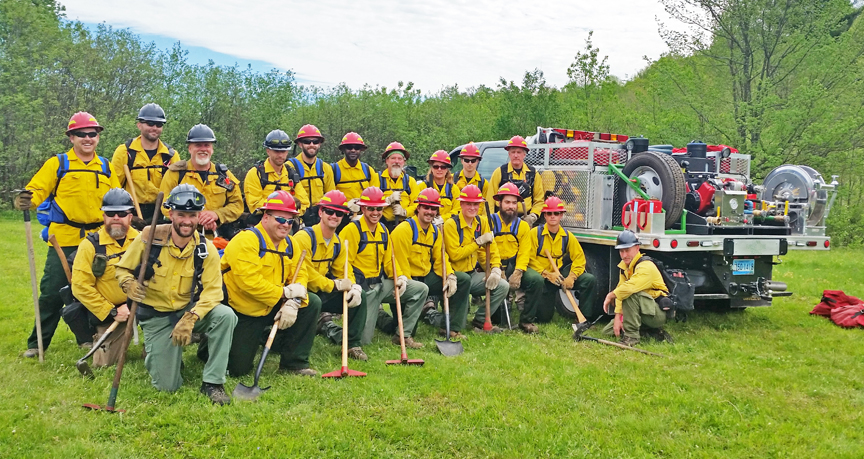Connecticut Interstate Fire Crew

Through a Master Wildland Fire Agreement with the USDA Forest Service and other federal partners, the Connecticut Interstate Fire Crew (CIFC):
- Protects the people and property in Connecticut through the suppression and management of local forest fires;
- Responds to large-scale state requests for assistance, such as severe weather events; and
- Works with government agencies across the nation to protect lives, personal property, and natural resources threatened by wildfire.

Over the years, CIFC responsibilities have expanded to include:
- Wildfire suppression in eastern Canada through the Northeastern Forest Fire Protection Compact (NFFPC), and
- Large scale FEMA incident responses and other national emergencies declared through the Robert T. Stafford Disaster Relief and Emergency Assistance Act.
According to the National Interagency Fire Center, in 2023 wildfires consumed over 2.6 million acres at a cost of $2.70 billion. Sadly, often times tragedy accompanies these manmade and natural disasters. DEEP takes great pride in contributing to a National response team during times when local resources are overwhelmed and need assistance.
CIFC members go through an initial rigorous training regime, including:
- Classroom time,
- Field exercises, and
- Physical agility testing.
After initial testing, eligible applicants reapply every year and are required to go to annual training and pass an annual physical agility test. Advanced training includes developing leadership skills, and many members may also be eligible to obtain additional specialized wildfire and emergency response credentials within the National Wildfire Coordinating Group (NWCG) guidelines and criteria.
CIFC Timeline
- November - CIFC Applications are sent out.
- April - Pack Test is held (3 mile walk within 45 minutes, wearing 45 pounds).
- May or June - New Recruit Training
- May or June - Annual Refresher Training
CIFC Recent Fire Assignments
- 2023 -- 45 CIFC members responded to wildfire incidents in Montana, North Carolina, Nova Scotia, Quebec, Oregon, Washington, Idaho, California, and Rhode Island.
- 2022 -- 16 CIFC members responded to wildfire incidents in Texas, Oregon, California, Idaho, and New Mexico.
- 2021 -- 58 CIFC members responded to wildfire incidents in Arizona, Minnesota, Washington, Idaho, California, Montana, and Oregon.
- 2020 -- 24 CIFC members responded to wildfire incidents in California.
- 2019 -- 3 CIFC members were mobilized to South Carolina for wildfires.
- 2018 -- 27 CIFC members responded to wildfire incidents in Idaho, California, Texas, Montana, and Oregon.
- 2017 -- 16 CIFC members were mobilized to assist in wildfire suppression in Montana, Oregon and Idaho.
Frequently Asked Questions about CIFC
Please contact deep.forestry@ct.gov to receive detailed information about the Connecticut Interstate Fire Crew application and training process.
Fire Prevention and Control main page
Content last updated in August 2024

